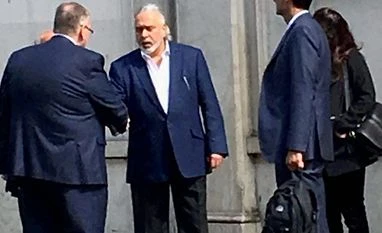It is perhaps easy to miss the coincidence of two developments taking place in quick succession this week, but their significance in national politics should not be underestimated. Nor should there be any celebrations over an early resolution to the problems that those developments are seeking to address.
On Monday, the Supreme Court ordered the auction of the Aamby Valley property of the Sahara supremo, Subrata Roy, to help recover from him dues that market regulator, the Securities and Exchange Board of India (Sebi), estimates to be over Rs 47,000 crore, including interest. Of this amount, the group has so far paid back Rs 11,477 crore.
A day later, the United Kingdom (UK) authorities started extradition proceedings against Vijay Mallya, who allegedly owes over Rs 9,000 crore to banks in India and has been staying away from India for the last 13 months. After the UK Secretary of State certified that extradition proceedings could begin, the London police arrested Mallya and produced him before a local court, which granted him conditional bail.
Purely from an economic governance point of view, these steps mark just the beginning of what would certainly be a long process of recovering dues from Subrata Roy and Vijay Mallya. But that the process has begun augurs well for a country where action against malfeasance is rare and when the process does start, it is excruciatingly slow. And worse, when the process ends after many years, the accused often get away with relative ease.
For instance, it would only be on April 27 that the Supreme Court is expected to get a valuation report for Aamby Valley, a luxury township in Maharashtra. Even if the auction process starts on that day, it would take many more weeks before the sale of the asset takes place and the money is recovered.
Similarly, Mallya will get 14 days to appeal against any decision by the local court to refer his extradition case back to the UK Secretary of State (equivalent of the Indian external affairs minister) to take a final view on the Indian government’s plea for extradition. The next hearing of the local court is scheduled for May 17.
So, theoretically, if a decision on pursuing the extradition is taken by the local court on that day, Mallya can appeal before the high court before May 31. If that appeal is turned down by the high court, Mallya has another 14 days to plead before the Supreme Court for a review. Only after that route is exhausted, the final decision on the plea for Mallya’s extradition would be taken. The UK Secretary of State will have four weeks to take a call on this after giving Mallya a chance to explain his case. So, Mallya’s extradition is not likely before July 2017.
Remember also that UK elections have been called and they are to be held on June 8. So, a final decision on Mallya’s extradition would be taken by a newly elected government, if not a new UK Secretary of State. And who knows, the issue of Mallya’s extradition can become an emotive political campaign issue in the run-up to the elections and remember that the UK has a sizeable number of voters of Indian origin.
In India, however, the Modi government is likely to reap significant political gains from the action of the Supreme Court against the Sahara property in Maharashtra and the Indian government’s success in initiating the extradition process against Mallya. It is likely that the Modi government would cite both the developments as its success in taking to task Big Money that has been accused of malfeasance.
Remember that tackling crony capitalism and black money was one of the 2014 poll planks riding on which the Bharatiya Janata Party (BJP) formed its government. So far, there have been a lot of noise about black money, but this is the first big instance where in one week and on two successive days action has begun on recovering dues from two big names of Indian industry whose political connections also have been controversial. It is not surprising that the BJP has already swung into political action by reminding people about the virtual absence of credible action against them by the previous government.
Critics would of course argue that the credit for the action against Subrata Roy and Vijay Mallya should not go to the government but to the courts - Supreme Court against Roy and the UK court against Mallya. But that argument does not wash as the fact is that it is because of the insistence of Sebi under the BJP-led government that a stage has reached where Roy’s premiere township complex is going to be auctioned to recover dues from him. Similarly, the efforts initiated by the Union finance ministry under the Modi government have been primarily responsible for ensuring the certification of extradition proceedings against Mallya by the UK government – a process that has now led to his arrest, release on conditional bail and the start of the extradition proceedings under a court’s supervision.
It is only a matter of time before the Modi government would go to town with these two cases as its achievements against financial irregularities committed by big business. There is a good chance that these steps would be used to further enhance the image of the Modi government as a crusader against crony capitalism and malfeasance. The Congress or other Opposition political parties would have very little to counter such a campaign.
Unlock 30+ premium stories daily hand-picked by our editors, across devices on browser and app.
Pick your 5 favourite companies, get a daily email with all news updates on them.
Full access to our intuitive epaper - clip, save, share articles from any device; newspaper archives from 2006.
Preferential invites to Business Standard events.
Curated newsletters on markets, personal finance, policy & politics, start-ups, technology, and more.
)